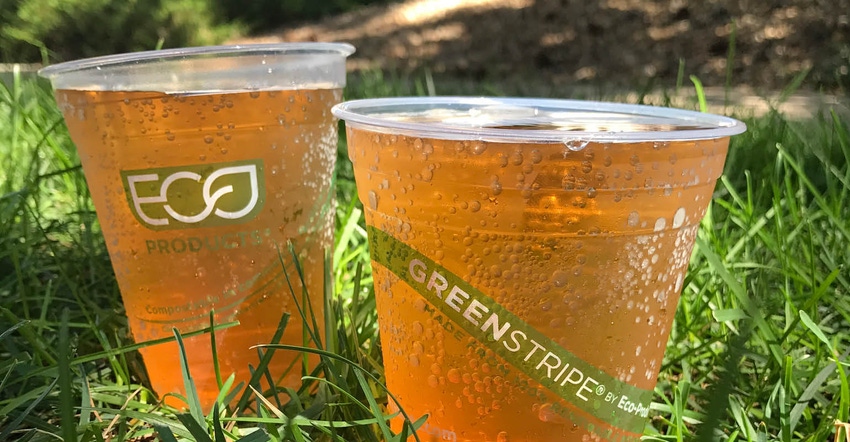All plates, utensils and trays can go into the same bin for compostables—along with any leftover food.

Eco-Products is partnering with the National Aquarium in Baltimore on an effort to turn guests’ trash into fertile soil.
Eco-Products, based in Boulder, Co., is supplying thousands of compostable cups plates, lids, utensils, containers and trays to the aquarium’s food service locations. This now replaces all conventional disposable foodware plastic products with reusable, compostable or more sustainable options.
“This change is at the heart of our conservation mission, eliminating sources of pollution both for ecosystem and human health, and inspiring our guests to do the same, even after their visit,” Kris Hoellen, chief conservation officer at the National Aquarium, said in a statement. “Utilizing innovative Eco-Products items promotes an essential life-cycle approach to materials, whereby what once went in a landfill is now helping our trees and plants grow.”
The new effort simplifies things for guests. All plates, utensils and trays can go into the same bin for compostables—along with any leftover food.
“It’s hard to get guests to first scrape the cheese off a plastic plate—and then toss the cheese into one bin to be composted and the plate into another,” said Sarah Martinez, director of marketing at Eco-Products. “This makes it as easy as possible to divert materials from landfills. Guests can throw their plate, cup and any leftover food into the same bin.”
The cups, plates, containers and lids from the aquarium will have a second life: They’ll be turned into nutrient-rich soil and mulch for area farms, gardens—and even Waterfront Park surrounding the aquarium.
The compostable cups, plates, utensils and trays from the aquarium will be combined with other organic waste at Recycled Green Industries, a commercial composting facility in Woodbine, Md. A portion of the resulting soil from this process will return to the Inner Harbor to be used in planters on campus.
“The benefits of this effort extend way beyond the National Aquarium,” Martinez said. “It’s a wonderful example of how used items don’t need to become waste. They can have another life.”
The new effort culminates a multiyear effort to reduce the use of conventional disposable plastics across the aquarium’s operations. Working closely with on-site partners Sodexo, the Classic Catering People, Pepsi and others, the aquarium had already eliminated all disposable water bottles, ended the use of plastic bags in the gift shops and eliminated conventional single-use plastics at catering events.
That effort now goes all the way to providing plates made from sugarcane for guests at the aquarium. Now every compostable product serves as a reminder about being smarter when it comes to our natural resources.
About the Author(s)
You May Also Like


